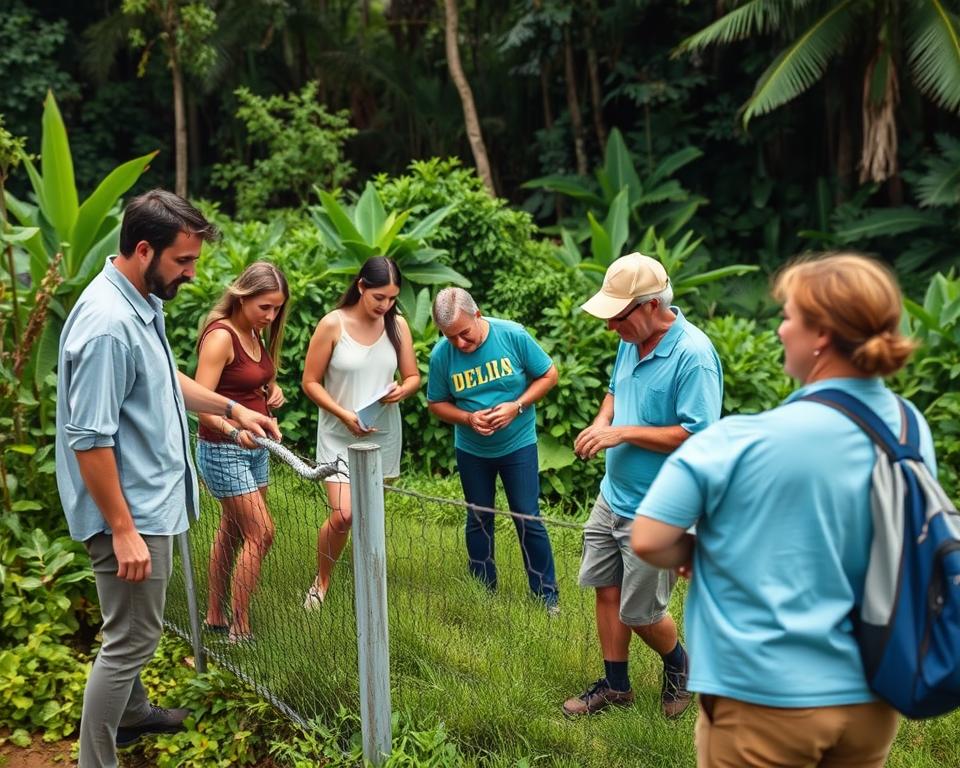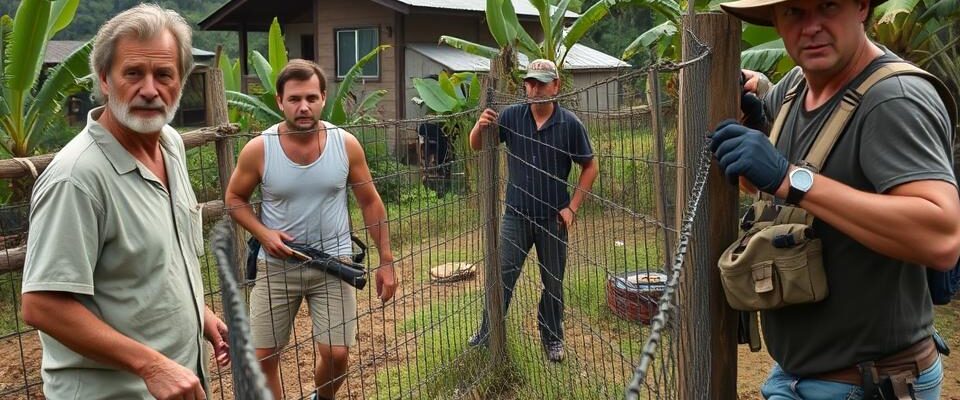Protecting Property: Stop Squatters in Costa Rica
Are property owners in Costa Rica unknowingly setting themselves up for loss of ownership by failing to act swiftly against squatters? It’s key to know how to stop squatters in Costa Rica to protect property rights. With the complexities of real estate in Costa Rica, many owners might underestimate the legal implications of squatters.
Given that squatters can claim legal rights after just ten years of occupation, it’s crucial for property owners to be informed and proactive. GAP Real Estate, with over two decades of experience in the region, emphasizes the vital steps needed to maintain ownership. They ensure one’s investment remains secure amid rising property values.
Key Takeaways
- Squatters can acquire ownership after ten years of occupying a property.
- Legal procedures for obtaining land titles can range from $1,500 to $3,000.
- Property owners should act within three months of squatter occupation to prevent rights acquisition.
- Regular property maintenance and security measures are essential in preventing illegal land occupation.
- Land disputes and eviction processes can be lengthy and complicated in Costa Rica.
- Understanding adverse possession laws is crucial for property owners.
Understanding Squatter Rights in Costa Rica
In Costa Rica, squatter rights are tied to adverse possession. This rule lets squatters own a property if they live there without permission for a certain time. Knowing about these rights is key for property owners to protect their interests and handle squatters well.
Overview of Squatter Rights
Squatters can own a property after ten years of living there continuously, under specific rules. This shows why it’s vital for property owners to understand these rights. They must act fast to avoid legal issues. If owners ignore squatters for over three months, squatters’ claims get stronger.
Owners need to know their legal rights against squatters. This helps them deal with the tough situation better.
Legal Implications for Property Owners
If owners don’t act quickly, they risk losing their property. The laws around squatter rights are complex. Quick action can help keep control over a property or avoid long disputes.
It’s important to use legal resources to find ways to handle squatters. For more info on squatter rights and what owners can do, check out this resource.

Conditions for Squatter Claims in Costa Rica
The laws about squatter claims in Costa Rica are complex. For those living on properties without permission, knowing the time limits is key. Generally, squatters need to stay on a property for at least ten years to gain legal rights. This rule is part of the broader laws on land squatting, showing how adverse possession can lead to property claims under specific conditions.
Time Requirements for Squatters
The time it takes for squatters to gain legitimacy varies by state. While ten years is common, it can be seven to twenty years. Property owners must act quickly to stop unauthorized occupants. Waiting too long can make it harder to get the property back and strengthen the squatters’ claim.
Good Faith Usage of Property
Another important factor is whether squatters use the property in good faith. To keep their claims, squatters must not harm the rights of property owners. They should take care of the property and not interfere with the original owners’ rights. If they can’t show good faith, they might lose their claim, allowing owners to reclaim their property more easily.
Property owners should stay alert and know the details of squatters’ rights and land squatting laws. Those dealing with illegal occupants can find more information and ways to protect themselves in this informative guide.
How to Stop Squatters in Costa Rica
Property owners in Costa Rica should take steps to prevent squatting. Regular checks and upkeep help keep control and visibility. Marking property boundaries clearly shows ownership and warns off squatters.
Being present and active can stop unauthorized entry. It shows you’re watching and won’t let squatters take over.
Proactive Measures for Property Owners
Effective security is key for property owners. Here are some ways to boost safety:
- Regularly check your property to make sure no one is there without permission.
- Install security cameras and alarms to watch over your property.
- Join a neighborhood watch to keep an eye on your area together.
- Keep valuable items in safe places to avoid theft.
- Post clear signs to show who owns the property and stop squatters.
Importance of Timely Legal Action
Acting fast is vital when dealing with squatters. If they stay for over three months, getting them out gets harder. Owners need to be quick to start legal action.
It’s wise to get a good real estate lawyer. They can help understand Costa Rican laws and speed up the eviction process. Waiting too long can lead to long disputes and more costs.
Legal Framework Surrounding Property Ownership
It’s key to know the laws about owning property in Costa Rica. Knowing about land ownership types and issues helps people protect their investments. It also makes sure their rights are respected.
Types of Land Ownership in Costa Rica
Costa Rica has different ways to own land, including:
- Fee simple title, which gives full ownership rights and control over the property.
- Concessions, usually for coastal and protected land areas.
- Possession rights, often for informal settlements or properties without formal titles.
Each type has its own rules and responsibilities. This affects how people deal with squatters and other ownership problems. The National Registry helps verify property ownership, liens, and mortgages, lowering the chance of title issues.
Understanding Land Tenure Issues
Land tenure issues in Costa Rica are complex, affecting property rights and squatter claims. Knowing the property laws helps spot potential disputes and risks. For example, the Maritime Zone Law controls coastal land, needing special permissions for development.
Stricter zoning laws require approvals from different government agencies. This makes owning and using property more complicated. Land trophy rights can also play a role in property deals. Buyers should do their homework and check a property’s history before buying.
Working with experienced professionals is wise, even more so for foreign investors. Looking at listings like homes for sale in Costa Rica can give insights into the market.
Steps for Evicting Squatters
Property owners facing squatters must be ready to take several steps to get their property back. Starting the right procedures helps make the squatter removal process smoother, even with its challenges.
Initial Steps for Evicting Squatters
The first step is to give squatters a formal written notice. This notice should clearly state when they need to leave. If they don’t leave, property owners must file an eviction complaint in court. Following the legal rules in Costa Rica is crucial to avoid problems.
Challenges in the Eviction Process
The eviction process comes with many challenges. Property owners might face legal issues if squatters fight the eviction. There can also be delays and extra legal costs.
Squatters might claim they made improvements, making things even more complicated. Knowing these challenges helps property owners plan better and improve their chances of eviction success.
Preventing Illegal Land Occupation
Keeping your property in good shape is key to stopping squatters. Regular upkeep not only makes your property look better but also keeps unwanted visitors away. Owners should check their property often to spot any issues early. Adding visible security measures helps a lot.
Regular Property Maintenance
Keeping your property in top shape is a strong defense against squatters. A neat landscape, clean outside, and clear views can scare off squatters. Here’s what owners can do:
- Make it a habit to check your property regularly.
- Keep your gardens and lawns looking good.
- Lock up buildings and utility areas to stop trespassers.
Installing Security Measures
Adding security features is another great way to keep squatters out. Strong security shows that your property is always watched. Some good security steps include:
- Putting up fences around your property.
- Setting up outdoor cameras for watching over your place.
- Getting alarm systems that alert you to intruders.
By focusing on these steps, owners can lower the chance of squatters and keep their property safe.

Legal Actions Against Squatters in Costa Rica
Dealing with squatters in Costa Rica means knowing your legal options. It’s key to understand the eviction process to get your property back. This involves filing complaints, collecting documents, and going through court. Getting advice from legal experts helps you plan your next steps.
Understanding the Eviction Process
Property owners need to know Costa Rica’s eviction laws. The steps usually are:
- Filing a complaint about unauthorized people living on your property.
- Showing proof of ownership.
- Going to court to present your case.
The legal steps to remove squatters can change based on your situation. Knowing the eviction process helps you take back your property. It also helps avoid delays in the legal system.
Resources for Legal Assistance
Getting help from legal experts is crucial. They can offer great advice. Here are some ways to find help:
- Talking to local law firms that know real estate law.
- Visiting government offices that deal with property issues.
- Using real estate groups for info on rights and legal steps.
Legal advice on squatters is very helpful. It helps you understand local laws. Keeping up with legal resources helps you deal with squatters and follow Costa Rica’s changing laws.
Conclusion
Understanding squatters’ rights in Costa Rica is key for property owners. Knowing the legal side helps protect your assets. This article showed how to act fast and prepare well to keep your property safe.
When buying or selling property, working with a trusted agency is a must. GAP Real Estate offers expert advice to safeguard your property in Costa Rica. They know the local laws well, helping avoid squatter problems early on.
Buying or Selling? Call GAP To Get Started Today
The real estate market in Costa Rica is complex. With property values sometimes lower than they should be, getting professional help is crucial. GAP Real Estate can guide you through zoning laws and closing costs, which are about 5-6% of the sale price. Start your real estate journey today.




